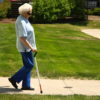Nutrition What’s Important to Know About Nutrition if You’re a Senior As we age, our metabolism slows down. As a result we need fewer calories. Because we need fewer calories, it’s important that the calories we take in, are from nutrient-rich foods. Nutrition is important for proper function of the digestive, circulatory and nervous systems. Proper […]
Archive | Uncategorized RSS feed for this section

February News: Heart Healthy Living
Six Steps to a Healthy Heart As we get older, heart health issues emerge. We may develop high cholesterol or high blood pressure. Work with your health professional to keep these heart health problems under control. No matter what your age, it’s never too late to start living a healthy lifestyle and getting your heart disease […]

January News: How’s Your Balance?
Do you have good balance? Balance is often negatively affected because seniors lose feeling in their feet due to arthritis, diabetes, poor circulation or complications from a stroke. Some medications have side effects that impact balance. In addition, mild dementia also causes balance problems. So, what can you do? Proper exercise builds strength and improves […]
December News: Trouble Sleeping?
Trouble Sleeping? As we get older, changes to sleeping patterns are a part of the normal aging process. Many older adults report being less satisfied with their quality of sleep and find themselves more tired throughout the day. For older adults, a good night’s sleep is important because it improves concentration and memory function and allows […]
November News: Take The Challenge
Take the Challenge It’s a challenge at the holidays to make healthy food choices when so many delicious, rich foods are being served. Remember, the holidays are a time for family and fun. Don’t focus just on food. Offer to bring your favorite diabetes-friendly dish to the dinner. The hostess will appreciate that. Drink in […]
October News: A Lack of Vitamin D May Contribute to Osteoporosis, Muscle Weakness, Hip Fractures, and Other Problems
Vitamin D and Seniors A lack of Vitamin D may contribute to osteoporosis, muscle weakness, hip fractures, diabetes, cancer, heart disease, arthritis and overall poor health for seniors. But not many foods contain Vitamin D. The best food sources of Vitamin D are cod liver oil, salmon, mackerel, tuna, beef liver cheese and egg yolks. […]
August Special News Flash: 2015 Flu Shots Soon Available!
Don’t wait! Call (314) 726-5600 to speak with a Senior Care Consultant who can schedule a flu clinic in your facility for the safety and convenience of your residents. …And keep watch for a future post on “walk-in” days and times for individual flu shots that will be given at AW Health Care, conveniently located in University […]
May 2015 News: What Music is Best for Pain Relief?
Arthritis Pain – Manage It with Music and Yoga! Good Everyday Ideas During the day, if you’ve been sitting, adjust your position frequently. Periodically tilt your neck from side to side. Bend and stretch your legs. Pace yourself. Take breaks so that you don’t over use a single joint and cause more pain. Stand up and walk […]
Aging Well Journal Newsletter – April 2015 Foot Health
Foot Health: A Step in the Right Direction Congratulations! You are a senior citizen! You are now entitled to retire, receive discounts and even play Bingo 5 nights a week if you want! But aging also has its downfalls. Now you have a responsibility to yourself to keep your feet healthy so you can still […]
Aging Well Journal Newsletter – March 2015 Nutrition & Hydration
Nutrition & Hydration How Do Nutrition and Hydration Needs Change with Age? Older adults do not burn as many calories as do younger people. People’s appetite and digestive process slows down. But that does not mean that older adults do not need a good diet. Dietary needs become more important with age. Older people need vitamins, […]
Frequent Questions
Medical Home Health
Are Home Health Services appropriate for me? AW Home Health encompasses a wide range of…Testimonials
The whole AW Home Health Team was fantastic. Bryan and Lalit were very compassionate and understanding. They are the #1 reason that my mom improved as much as she did. I could not have been more satisfied.
My mom and dad are in their 90s, physically frail but mentally alert and often somewhat challenging to deal with. Your team of professionals treated mom and dad with dignity, care and respect for which my family is very grateful.
Professionalism…that’s what impressed me the most.
Special thanks for outstanding professional services provided by Natalia. Her unique compassion skills helps to keep my high spirits during difficult days when I get my treatment, fighting my illness. She is a very valuable employee of your agency. Thanks.
Natalya is fabulous! Roycelain (PD aide) is the best health worker we’ve ever had! —Norma S.
I was most impressed with the physical therapy. My therapist was Matt. He informed me of everything he was going to do. —Norma W.
As a child of a father who fought cancer, I deeply appreciate the value of the services provided by AW Healthcare.
Everything was so great! I hated when it ended…
On behalf of my family, I cannot thank you enough for the exceptional and service you provided my dad the past couple of months while he was receiving home care services. If I can ever provide a recommendation, referral or feedback on your service please feel free to let me know.
I think your agency is perfect the way it operates now. Change nothing. What most impressed me was the respect and care that I received. At all times the caregivers were excellent to both my husband and myself. They went out of their way to be accommodating. Thank you! —Katherine B.





